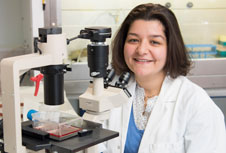Christchurch campus offers ideal pathway to PhD

Bee Bathish
As a Canterbury undergraduate science student, Bee Bathish dreamed of working in a laboratory on health research projects. She was therefore thrilled to discover the University of Otago, Christchurch had the pathway for her to progress from biochemistry student to working medical researcher.
“Medical research was always a dream for me. I am curious and I want to know how pathologies develop. I believe that medical research saves lives. I want to work on projects that make a difference for patients and contribute positively to society.”
Bee was part of the Christchurch campus' Summer Studentship programme, working under the supervision of world-renowned free radical researcher Professor Margreet Vissers. She then completed the one-year, laboratory-based Bachelor of Biomedical Science (Honours) course.
“It was the best year in my academic career. I got to explore many biomedical research techniques and learn the fundamentals of scientific research. My research project was in cancer epigenetics.”
Doing the Summer Studentship, then the Honours course also confirmed her desire to work as a health researcher.
Bee is now working as an Assistant Research Fellow and undertaking her PhD.
Her PhD project is with the Centre for Free Radical Research. She is investigating indigenous oxidants and protein oxidation in health and diseases.
“Our bodies produce oxidants as part of normal physiological processes. These powerful oxidants, such as hypohalous acids, are double-edged swords: they play essential roles in health, such as immunity, but they could also be harmful and cause inflammation”.
Bee is aiming to understand how hypohalous acids are produced in the body and interact with proteins. Research in this area will lead to a better understanding of the role of oxidation and inflammation in heart diseases, diabetes and cancer.
